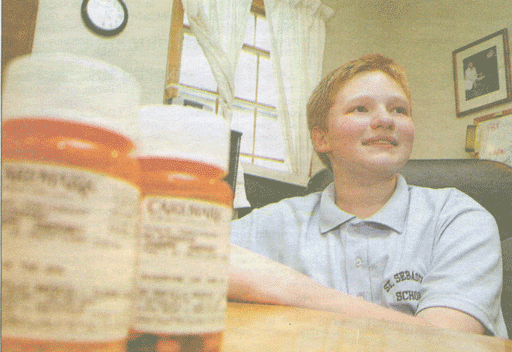extreme Catholic






A pill vacation for kids? : Newsday
I was too busy and having too much fun to keep the blog going in the last few weeks, but I'm adding to article to praise my son for his efforts in dealing with his ADHD and overcoming it. What the writer didn't include from the interview with my wife was that we know from experience how to reinforce good behavior when he's not on meds so that his personality and maturity can develop with and without medication.

A pill vacation for kids? Experts and parents debate value of letting hyperactive children chuck medicine along with their schoolbooks
BY SOPHIA CHANG, Newsday Staff Writer
June 20, 2006
Joseph Sweeney goofs off more during the summer, and not just because he's out of school. The 12-year-old from Woodside, Queens, also takes a "medication vacation" from his pills for attention deficit hyperactivity disorder."When I'm hanging out with my friends in the summer, I don't take my medicine because then I'm more of an outgoing, funny person," he said. "I like it when I don't take medicine."
His mother, Karin Sweeney, has taken her son off of his Dexedrine every summer for the past four years because she wants him to have a carefree vacation.
The medication "controls his personality so that he would be more serious in school, but there wouldn't be the fun-loving part of him. We wanted the other side of him to develop, too," Karin Sweeney said.
The question of when to take kids off these drugs is one that many parents of the estimated 2.5 million children on ADHD medication face, according to a 2003 report by the federal Centers for Disease Control. Most families choose to stick with the same medicine schedule year-round because they want their kids to be able to learn and focus even when not in class, doctors say.
But some parents see summer as a time to assess how their children fare without medication.
"The only way to really find that out is to have an opportunity to really take them off the medicine and evaluate their functioning," said Dr. Howard Abikoff, director of New York University's Institute for Attention Deficit Hyperactivity and Behavior Disorders. "The summer can be a good time to do that."
Many parents first gave their kids summer breaks because they thought that ADHD medications, such as Ritalin and Concerta, were primarily to help students focus at school, said Dr. Gabrielle Carlson, director of child and adolescent psychiatry at Stony Brook University.
"Parents had felt guilty about keeping kids on medication that was only seen as a school aid. So if a child wasn't in school, there was no point in giving him or her medication," she said. "But there's been an increasing emphasis on the fact that ADHD is a chronic disorder that doesn't go away in the summer or on weekends."
Doctors caution that children who are more hyperactive when they are off their medicine might not benefit from taking a break.
"Children who tend to be impulsive and intrusive - some of those behaviors will re-emerge if they are not on the medication," Abikoff said.
It's easiest for children on the most common ADHD medicines, stimulants like Ritalin, to try a vacation, doctors say. Those medicines don't linger in children, and doctors liken the effect of taking a break from them to taking off a pair of glasses.
And though there is still debate over the possibility of growth suppression in a small percentage of ADHD children due to drug-related loss of appetite, Abikoff said a summer break "can provide a potential for growth rebound or acceleration in growth trajectory."
But some parents fear more harm than help comes from taking a break. Jeanne Neville of Great River, a mother of two ADHD-diagnosed children, feels that her teenagers benefit socially from staying on their medication.
"There are social skills, everyday things that continue after the school bell rings," she said. "If you have a deficit that's interfering with you learning in all those areas, then you are missing out."
Doctors say any family considering a medication vacation should consult the child's pediatrician and coordinators of programs outside the home.
Eileen Turner, health director at Hofstra University's summer camps in Hempstead, estimates that each summer there are at least a hundred children enrolled whose medical forms indicate that they have been diagnosed with ADHD.
Turner trains camp counselors to be on the lookout for kids off their medication. "I tell the counselors to look for irritability, difficulty listening, she said. "Some of the kids cry and get emotional."
posted by Patrick Sweeney at 10:48 PM Permalink
![]()
 1971
1971 2003
2003








 Review extreme Catholic on blogarama
Review extreme Catholic on blogarama
